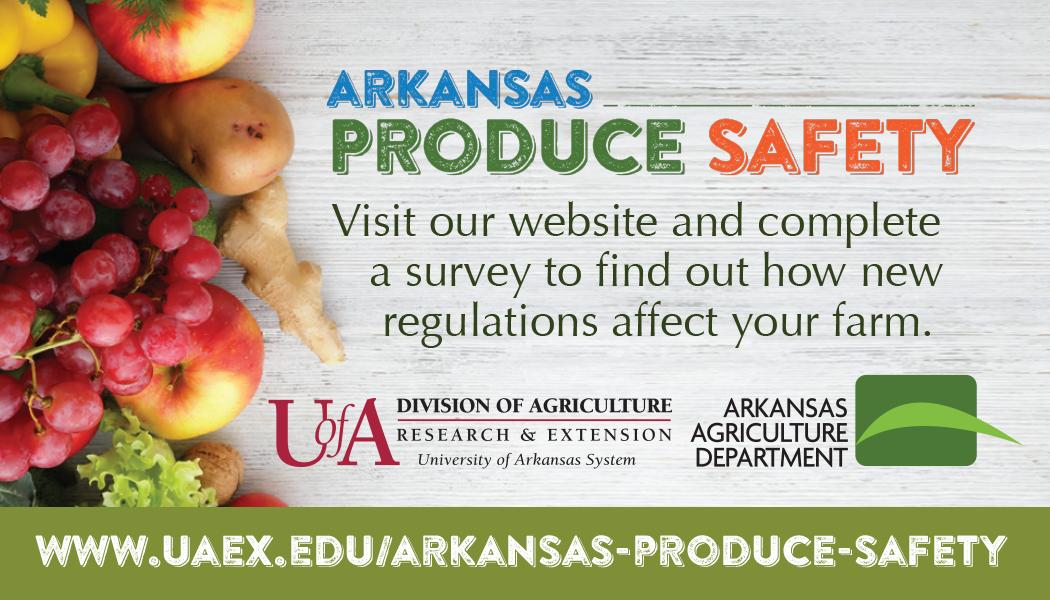Arkansas Extension Service to provide farmers help to comply with new produce safety rules
The Food Safety Modernization Act, or FSMA, meant to strengthen safeguards in the U.S. food supply, has a new rule for produce growers and the Cooperative Extension Service will be helping Arkansas farmers obtain needed certification.
Oct. 19, 2017
By Mary Hightower
U of A System Division of Agriculture
Fast facts
- Extension Service to help growers to understand, comply with new produce safety rules
- New FSMA meant to strengthen safeguards against food-borne illnesses
- Extension conducting outreach under contract from Arkansas Agriculture Department
(530 words)
(Newsrooms: ‘Philyaw’ is cq)
Download Word version
LITTLE ROCK – The Food Safety Modernization Act, or FSMA, meant to strengthen safeguards in the U.S. food supply, has a new rule for produce growers and the Cooperative Extension Service will be helping Arkansas farmers obtain needed certification.
The Cooperative Extension Service outreach is conducted under contract from the Arkansas Agriculture Department’s, whose overall education efforts are funded by a grant from the Food and Drug Administration to ensure farmers understand the new Produce Safety Rule requirements.

Amanda Philyaw Perez, assistant professor for the University of Arkansas System Division of Agriculture, with a doctorate in public health, will spearhead the outreach for the Extension Service as its produce safety educator.
“The overall Food Modernization Safety Act may represent change in the way producers run their operations,” she said. “The new regulations are meant to shift from reacting to outbreaks of food-borne illness to preventing them.”
“My job will be teaching Arkansas producers about the requirements and how to obtain certification and to meet the goals of this act, specifically the Produce Safety Rule,” Perez said.
Following the initial outreach, Arkansas Agriculture Department “inspectors, along with Extension personnel, will perform on-farm readiness reviews for the purpose of assisting farmers with compliance issues,” said Scott Bray, ADD’s Plant Industry division, adding that his department’s activities “will gradually move from compliance assistance reviews to regulatory inspections and enforcement actions if warranted.”
Controls where possible
On farms, in the outdoors, there are many factors that cannot be controlled. However,
the new regulations and the training that goes with the implementation will focus
on educating growers about good agricultural practices that may help to prevent contamination
common to most farming environments.
For example, standards have been proposed for agricultural water, farm worker hygiene or cleanliness, compost and sanitation conditions affecting buildings, equipment, and tools.
Produce growers with annual sales of more than $500,000 of any food must comply with the rule by Jan. 26, 2018. Those with sales between $250,000 - $500,000 must be compliant by 2019. Producers with sales between $25,000 - $250,000 must be compliant by 2020.
There are exemptions, including produce grown for personal or on-farm consumption, produce not consumed raw, produce that receives commercial process to reduce pathogens, items on the “rarely consumed raw” list, including okra, peanuts, pecans, chickpeas and sweet potatoes.
Most producers must participate in training, but even those farms that meet criteria for exemption may want to participate to learn about practices, ease consumers concerns, and prepare in advance if exemption status were to change.
Even if farmers were certified or audited Good Agricultural Practices and/or Good Handling Practices, they must still attend a Produce Safety Alliance grower training if the farm is not exempt, Perez said.
“While the GAP/GHP requirements are similar to the Produce Safety Alliance grower training, qualified farms must meet the requirements for completing a one-day PSA training,” she said. This includes implementing practices outlined in the training and undergoing an Arkansas Plant Board Inspection.”
- Nov. 7: Central – Little Rock/Ferndale at C.A. Vines Arkansas 4-H Center
- Dec. 6: Eastern – Forrest City at East Arkansas Community College
- Dec. 11: Northwest – Fayetteville at Don Tyson Center for Agricultural Sciences
- Jan. 9: Southeast – Monticello at UA Monticello
- Jan. 16: Southwest – Hope at Southwest Research and Extension Center.
A survey is available to help producers and processors determine how their farms will be affected by the Produce Safety Rule. For more information, contact Perez at aperez@uada.edu.
About the produce safety outreach
This educational outreach is supported in part by the Food and Drug Administration
through grant PAR-16-137. The views expressed don’t necessarily reflect the official
policies of the Department of Health and Human Services; nor does the mention of any
trade names, commercial practices, or organization imply endorsement by the United
States Government.
For more information about the FDA’s initiative, visit https://www.fda.gov/Food/GuidanceRegulation/FSMA.
About the Division of Agriculture
The University of Arkansas System Division of Agriculture’s mission is to strengthen
agriculture, communities, and families by connecting trusted research to the adoption
of best practices. Through the Agricultural Experiment Station and the Cooperative
Extension Service, the Division of Agriculture conducts research and extension work
within the nation’s historic land grant education system.
The Division of Agriculture is one of 20 entities within the University of Arkansas System. It has offices in all 75 counties in Arkansas and faculty on five system campuses.
Pursuant to 7 CFR § 15.3, the University of Arkansas System Division of Agriculture offers all its Extension and Research programs and services (including employment) without regard to race, color, sex, national origin, religion, age, disability, marital or veteran status, genetic information, sexual preference, pregnancy or any other legally protected status, and is an equal opportunity institution.
About the Arkansas Agriculture Department
The AAD is dedicated to the development and implementation of policies and programs
for Arkansas agriculture and forestry to keep its farmers and ranchers competitive
in national and international markets while ensuring safe food, fiber, and forest
products for the citizens of the state and nation. Learn more: www.aad.arkansas.gov.
# # #
Media Contact: Mary Hightower
Dir. of Communication Services
U of A System Division of Agriculture
Cooperative Extension Service
(501) 671-2126
mhightower@uada.edu
Related Links